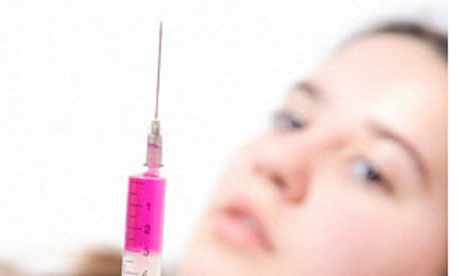
Doctors are urging ministers to mount a sustained attack on the UK's most common sexually-transmitted infection by immunising 12- and 13-year-old schoolgirls against genital warts.
Influential medical organisations want the jab that is already given to girls of that age to protect them against cervical cancer, to be replaced by one that also safeguards them against warts.
Doctors specialising in public health are pressing the Department of Health (DoH) to switch from the existing Cervarix vaccine to a dual-purpose jab called Gardasil. Genital warts afflict 170,000 people every year.
A decision is expected within the next few weeks on which vaccine should be used in the next four-year programme, starting in September 2012. Discussions with rival drug firms are almost over.
The programme to immunise schoolgirls against cervical cancer has proved highly successful since it began in 2008. Girls aged 12 and 13 who volunteer receive a series of three jabs. The latest DoH figures show that 77% of 12- to 13-year-old girls have had the full course, as have 76% of those aged 13-14, and 84% of 14- and 15-year-olds.
Cervarix protects against strains 16 and 18 of the human papilloma virus (HPV), thought to cause around 70% of cases of cervical cancer. Gardasil does too, but also reduces the risk of infection by strains six and 11, linked to more than 90% of cases of genital warts.
The British Medical Association believes ministers should accept "the superior health benefits and cost effectiveness of Gardasil. We strongly believe that Gardasil, which is also effective against HPV6 and 11, is now the better vaccination," the chairmen of its public health, dermatology and venereology committees have told the DoH. The UK should follow Australia, which saw an instant, huge and sustained drop in cases of genital warts in young women after it introduced Gardasil in 2008.
Dr Colm O'Mahony, chairman of the BMA's venereology sub-committee, said: "Apart from Holland, the UK is the only other developed country in the world exclusively using Cervarix in the national programme. It is a great shame that such an efficient and well-organised national vaccination campaign missed a glorious opportunity to eradicate this most distressing, time-consuming, expensive and common sexually transmitted infection."
Dr Tony Falconer, president of the Royal College of Obstetricians and Gynaecologists, also backed a switch. "Good sexual healthcare includes a range of preventative measures such as better education, condoms, screening and an HPV vaccination programme. We are in favour of a vaccine that provides additional protection. However, the priority must be to save lives by preventing cancer," he said.
Dr David Elliman, the Royal College of Paediatrics and Child Health's immunisation spokesman, said: "If there were no difference in the price, Gardasil would be clinically the best option. But the decision must factor in the scarcity of NHS resources."
A recent survey by the British Association for Sexual Health and HIV found that 93% of specialists in the field would advise friends to choose Gardasil over Cervarix, while 61% of those with school-age daughters had already paid for them to have it privately. "There is such a strong feeling amongst our members that the government got this decision wrong last time round," said the group's president, Dr Keith Radcliffe.
Philippa Taylor, head of public policy at the Christian Medical Fellowship, said she did not oppose in principle extending the vaccine to include genital warts, but added: "The context in which the HPV vaccine is promoted utterly fails to promote sexual abstinence and faithfulness. There is no addressing by promoters of the vaccine of the need to change sexual behaviour by advocating a preventative approach."
The DoH said: "England has one of the most successful HPV vaccination programmes in the world. Discussions are concluding. An announcement will be made in due course."

